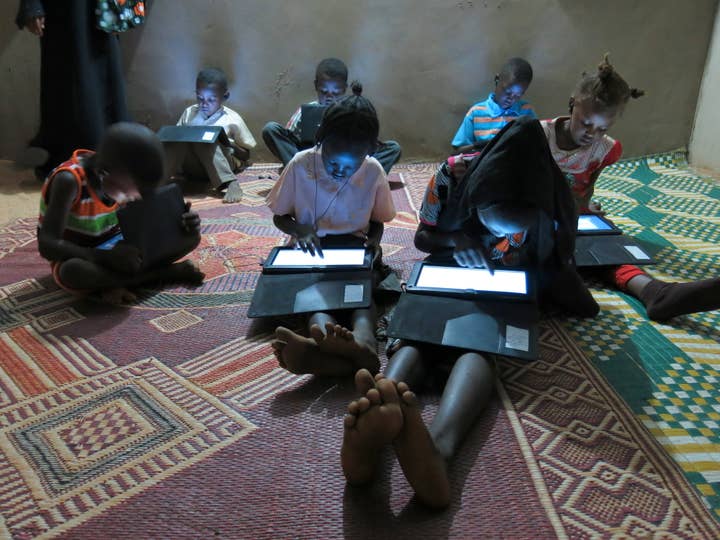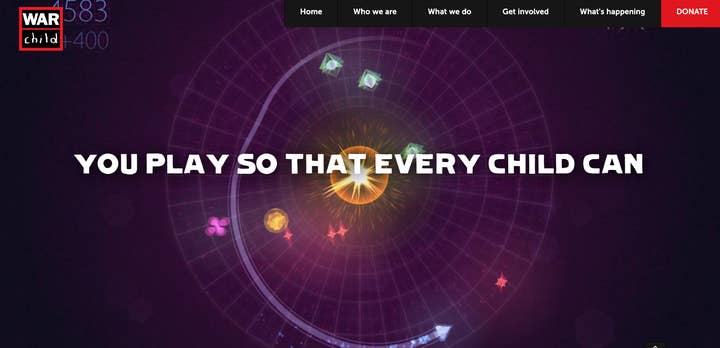Why the games industry holds the key to War Child's future
The charity that supports children in war-torn areas reflects on its blossoming relationship with video games
In 2006, Football Manager creator Miles Jacobson arranged his first partnership with War Child, the UK-based charity that dedicates its time and resources to supporting young people suffering in regions torn asunder by conflict.
Partnerships between the games industry and charities are becoming an admirably common occurrence, but this particular collaboration - now in its 11th year - was the beginning of a relationship that would unlock new doors for War Child.
Donations from every copy of Football Manager sold, charity livestreams by the community, and sales of special items such as football chants have raised well over £1m to date. This activity also led to War Child working with other Sega studios and being approached by Wargaming, the company behind World of Tanks.

"It was clear that the gaming industry presented a unique opportunity to directly engage with a diverse audience [and raise] awareness of the impact of conflict on children," Wayne Emanuel, the charity's gaming partnership manager, tells GamesIndustry.biz.
War Child's work ranges from providing education for children in Syria to rehabilitating former child soldiers, supporting young people even after the conflict has ended - "long after the TV cameras have gone home", as the organisation's website declares.
Jacobson is notable as one of the most prominent and vocal supporters of the charity, but its growing relationship with the games industry has attracted the attention of more studios. In 2016, five firms - Wargaming, Positech Games, iNK Stories, BlackMill Games and M2H - took part in the first War Child Armistice, a fundraising initiative that encouraged devs to sell peaceful options and content through war-themed titles, raising over £100,000. This War of Mine dev 11-bit Studios has also raised money via its special War Child DLC.
And last year, eleven studios - including Bossa, Creative Assembly, Rovio, Sumo Digital, Team17 and more - banded together to create Help: The Game, a bundle of original PC games that explored the work War Child carries out and the circumstances that make it so necessary.
Collaborations such as these have been invaluable to raising the profile of the charity and introducing it's activities to a new audience. As such, they've become much more central to War Child's overall operations.
"Gaming partnerships used to be a small addition to what we were doing but the organisation saw how important they were"
"Gaming partnerships used to be a small addition to what we were doing but the organisation saw how important they were," says Emanuel. "With engaged industry and gamers, as well as the growth of streaming and eSports, War Child made it clear that gaming should be part of the wider growth strategy.
"All of the collaborations mentioned above have allowed War Child to reach an audience far wider than traditional appeal campaigns in a far more interactive and innovative manner. When we speak to developers and gamers at events like EGX, it's always surprising to hear how many of them found out about War Child via the logo featured in Football Manager and the collaboration with This War of Mine."

It's a remarkable relationship between charity and industry, particularly given that the latter seems to make most of its money from high-octane action blockbusters that place players on the military side of war. As respectful as titles such as Battlefield 1 and the upcoming Call of Duty: World War II endeavour to be, such games are still marketed on the premise that war is an exciting, exhilarating experience. Does that not conflict with what War Child is attempting to do?
"We were confronted with this challenge internally," Emanuel admits, "which lead to the campaign 'Real War is Not a Game' to highlight the realities of war on children in conflict zones. This then lead to the creation of the hard-hitting video 'Duty of Care'.
"War Child Armistice was not about lecturing on what people should and shouldn't play, but to remind gaming fans of the real impact of war"
"War Child Armistice was all about proactively working with violent games, not to lecture on what people should and shouldn't play, but to remind gaming fans of the real impact of war. We take every opportunity where possible to promote the importance of peace - such as Verdun's Christmas Truce DLC, which allowed us to raise awareness of the issues that children affected by conflict face today.
"In addition to this, all the partners and gaming studios that War Child works with go through a rigorous risk assessment to ensure that we are achieving the above objectives."
While Emanuel and the War Child team acknowledge military conflict isn't going anywhere as a common theme for video games, he does ask developers to consider how they can illustrate the consequences of war - and not just for the soldiers at the heart of it.
"It's about balance," he says. "Part of why the collaborations work so well for us is that we try to focus on informing rather than preaching. If you look at the Armistice campaign in 2016 it was about adding a peaceful option to raise funds and awareness, [but] it should always be the players' choice.
"While it's really important to educate people about the issues, we also understand that people want to play the games they enjoy. For that very reason, it means that when there are games that are thematically related to work that we do, we are extremely keen to work with them where possible.
"War Child is always open to supporting developers who want to better represent what is happening in the world and we would work with them to create a bespoke and engaging solution."

The charity's latest effort to reach out to developers has been the launch of GameOn, an online hub designed to show off War Child's collaborations with games firms - and hopefully encourage more. The organisation has even brought in notable names as key proponents of its work, including Tim Schafer, Randy Pitchford, Rhianna Pratchett, Debbie Bestwick and Charles Cecil, to help gain the attention of developers and publishers the world over.
Says Emanuel: "This is a place for studios, developers, publishers, writers and gamers to share innovative integration ideas, support or sponsor eSports tournaments and events, and contribute to our next Help: The Game or Armistice fundraising project.
"What's really important is that all our collaborations work for the partner as well as War Child. Gamers won't engage if the collaboration isn't genuine and transparent, which is why we are always open to new suggestions and ideas from the gaming community.
"We're known in the charity sector for being innovative with our gaming partnerships - Armistice has just been nominated for 'Most Innovative Fundraising Campaign' - and we want to continue that whenever possible.
"We want to continually add more impactful personalities to the roster to increase our reach and help to change the lives of thousands of the world's most disadvantaged children."
